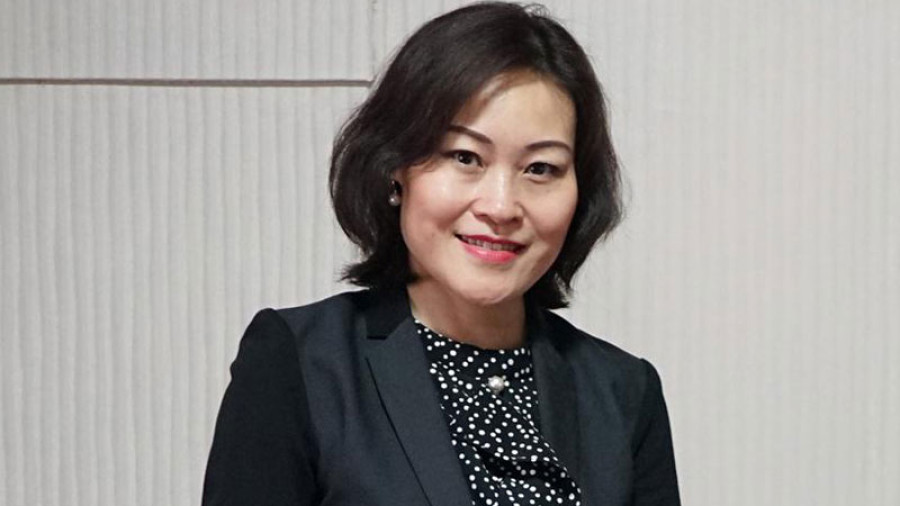National
Chinese envoy says cross-border railway is not an overnight project
In her first press meet, Hou Yanqi tries to assuage concerns surrounding Belt and Road Initiative and debt trap
Binod Ghimire
Nepal-China cross-border railway is a complex project and it cannot be expected to complete overnight, Chinese Ambassador to Nepal Hou Yanqi said on Thursday, just as she tried to assuage concerns among some sections of Nepali society that Nepal might fall into a debt trap if it implements projects under China’s Belt and Road Initiative.
“Cross-border railway is a complex project which will take time to construct,” Hou told the media in her first press conference since she took charge of the embassy in December last year. “The transborder railway is very important for both the countries, but owing to the difficult geography, construction is not an easy job. It is not going to be ready overnight.”
The Chinese envoy’s statement comes amid the heightened euphoria in Kathmandu around the cross-border railway, which was incorporated in the joint communique at the Second Belt and Road Forum in Bejing last month, also attended by President Bidya Devi Bhandari during her first state visit to the northern neighbour. “This is not a kind of project that can be completed in a few years,” said Hou.
“There are four phases for such mega projects—pre-feasibility, feasibility, design and construction—and now only the first phase has been completed,” she added.
Asked if China will construct the much-hyped project on grants, Hou said, “Discussion on the funding modality will start only after the feasibility study. It is too early to enter into the issue now.”
While the Chinese envoy’s remarks on the railway was a reality check, she tried to hammer home the message that Belt and Road Initiative does not add to the debt, creating a “debt trap”.
“It is unfair to say BRI leads to a debt trap as there is no instance where any country has been trapped in debt for their participation in the initiative,” said Hou. “Quite on the contrary, it is through participating in BRI cooperation that many countries have got out of the trap of no development.”
She also argued that the debt problem of the developing countries has a long history which goes long before the BRI initiative was conceived by Chinese President Xi Jinping.
As Nepal increases its engagement with China with a broader plan to build mega projects including Nepal-China trans-border railway, there are concerns from different quarters that it could land Nepal in a debt trap, like Sri Lanka from this region, if construction is done on Chinese loan.
People who closely follow China say BRI is an attempt by China to create a new world order by the means of infrastructure development.
Tanka Karki, a former Nepali ambassador to China, said as developed countries also have agreed to join the Chinese initiative, countries like Nepal cannot remain aloof from it.
“However, the funds must be used carefully. Solely our decisions determine whether we get into a debt trap or not. There is no point of a debt trap if the funding is used in the productive sector that gives returns,” Karki told the Post. “Being a small economy, Nepal should look for grants, soft loan and it should inject its own budget to construct mega projects under the initiative.”
Currently, Nepal is considering nine infrastructure projects under the initiative.
Since Nepal signed up to China’s Belt and Road Initiative in May 2017, there have been concerns from some countries, including the United States, over Nepal’s plans to build projects under Xi’s ambitious infrastructure initiative.
The United States has on more than one occasion cautioned that support under the BRI initiative should be entertained as long as the investment is designed to serve Nepal’s interests.
In his visit to Nepal earlier this month, US Deputy Assistant Secretary of State for South Asia, David J Ranz, said it should be looked very carefully whether the projects under the BRI are making a positive contribution to individual country’s economy and whether they are helping for employment generation.
Similarly, Joe Felter, deputy assistant secretary of defence for South and Southeast Asia, during his visit to Nepal in February, said, “Some activities associated with Belt and Road initiative that we see to be very much in China’s interest and not necessarily in the interest of the country the activities are taking place.”
The Chinese Embassy in Kathmandu was quick to respond to Felter’s statement, saying the US official’s comments were irresponsible.
On Thursday, the embassy once again asserted that the BRI initiative will not create a “debt trap” but will liberate underdeveloped countries from no development.
Stating that China, similar to other international financial institutions, does funding based on the equal consultation, Hou claimed that BRI now has become the largest platform for international cooperation where participants involved consult, work and enjoy benefit together.
“However, everyone should be clear that the BRI doesn’t provide non-reimbursement assistant,” Hou told the press meet which was organised on the day when India was announcing the results of its parliamentary elections, in which Narendra Modi has been handed yet another mandate to govern for five years.
India, with which Nepal conducts most of its cross-border and third-country trade, has not joined China’s Belt and Road Initiative.




 14.12°C Kathmandu
14.12°C Kathmandu















